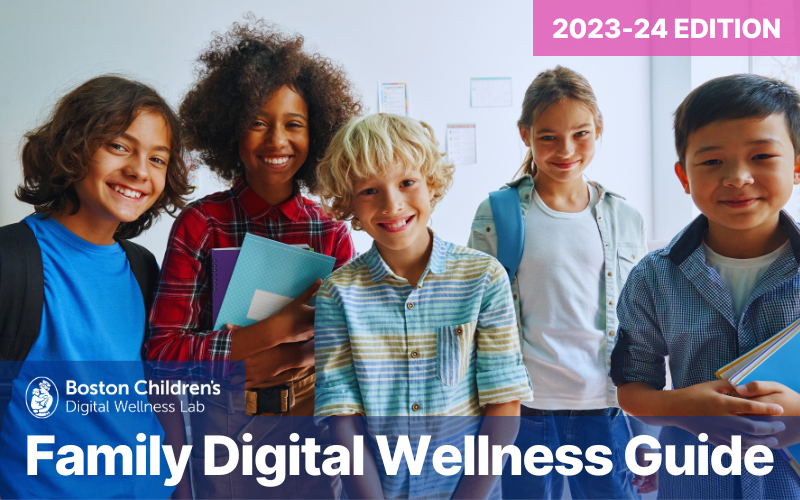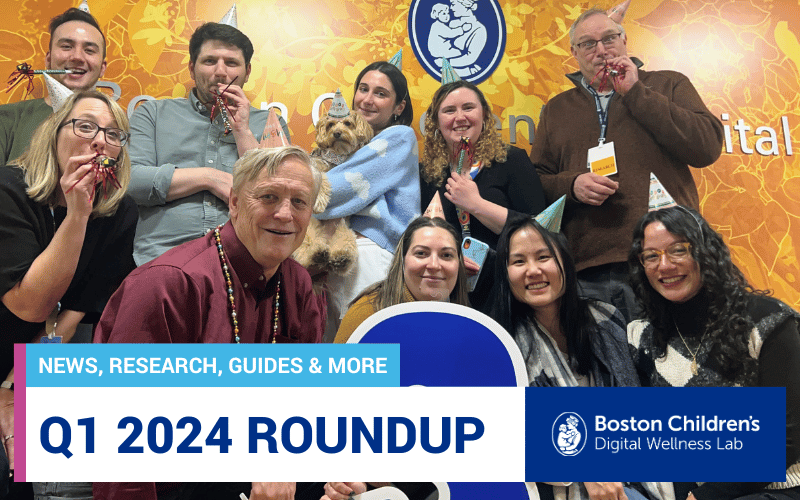The first quarter of the year found us celebrating our third anniversary, releasing our 2023 Impact Report, and bringing individuals and organizations from across sectors and the globe together to examine and address the impacts of the digital ecosystem on the mental, social, and emotional health of young people.
Q1 Highlights
- Served as featured panelists at the Human Change House during the 2024 World Economic Forum in Davos, Switzerland, taking part in important conversations about youth mental health within a digitally saturated world with global decision-makers.
- Released our latest Pulse Survey of over 1,500 parents and caregivers exploring emerging trends in household usage of AI-powered Voice Assistants and newer Generative AI technologies, and parents’ perceptions of their impact on children’s privacy, safety, learning and development.
- Watched with pride as Madeline Lee, a member of our 2023-24 Student Advisory Council, spoke from the main stage at the Common Sense Media Summit in San Francisco, sharing about her experiences with, and thoughts on, mental health and interactive media.
- Co-hosted the Building a Strong Foundation for Digital Safety panel with Roblox and served as a panelist on the Cultivating Citizenship Through Digital Interactions panel with Riot Games and the Joan Ganz Cooney Center at Sesame Workshop at SXSW in Austin, TX.
- Expanded the Inspired Internet Pledge to 10 Signatories and 10 Advisors.
- Gave a keynote presentation, Exploring the Intersection of Youth Well-Being and Technology, featuring the Lab’s research on youth mental health in today’s online world at the National PTA’s Thought Leaders Convening, in Washington, DC.
- Led a panel, Unlocking the Positive Potential of Gaming for Kids and Teens, at PAX East here in Boston in collaboration with colleagues from Modulate, FableVision, and Mightier.
Information You Can Use
We’ve rounded up notable resources and press from this past quarter, all related to creating a positive and healthy digital ecosystem for young people.
Designing a roadmap for a healthier digital ecosystem
In early December 2023, the Lab, with support from Pinterest, convened more than 60 experts from across different disciplines — including technology, media, education, mental health, government/regulation, and advocacy — for the first of of a series of Inspired Internet Pledge gatherings titled, “Tuning for Wellbeing.”
Our latest white paper features the key takeaways and recommendations this convening, sharing the group’s collective opinion of the digital wellness skills and knowledge young people need at each age and stage of development, along with what parents and caregivers, educators, content creators, governmental entities, and perhaps most critically, tech and media companies, can do to make the internet a healthier place.
Is AI content good or bad for kids?
A recent Wired article featuring input from the Lab’s Research Director Dr. David Bickham provides a glimpse into a rapidly growing world of AI-generated and -enhanced kids’ programming.
Dr. Rich Highlights Lab research in his new book
The Lab’s founder and director, Dr. Michael Rich, released his new book, The Mediatrician’s Guide: A Joyful Approach to Raising Healthy, Smart, Kind Kids in a Screen-Saturated World. In his guide for parents, educators, pediatricians, and technologists, Dr. Rich offers clinically tested, practical strategies for readers looking for answers on how children’s screen media use can affect their physical and mental health, and social wellbeing.
Our Student Advisory Council members share their stories about how tech is impacting their lives
We count ourselves as lucky to work with so many wonderful and engaged high school students from all over the country. We recently launched Teen Voices, a new blog series authored by our Student Advisory Council members, as a forum for them to share their thoughts about how engagement with digital media and social media affects mental, physical and social health in both positive, and negative ways. This is one of many steps we are taking to more deliberately bring student and youth voices into the conversation about media and health.
Read Pritika’s Blog Post →
Read Joshua’s Blog Post →
Read Sydney’s Blog Post →
Exploring the complex relationships between children and screens
Dr. Michael Rich sat down recently with developmental psychologist Dr. Aliza Pressman of the Raising Good Humans podcast to delve into the complex relationships between children, screens, and the digital environment. He shares his insights on the importance of developing critical skills for media use, strategies for managing and monitoring screen time, and the role of parents and educators in guiding children’s digital experiences
Learn More
To catch up on what else we’ve been up to at the Digital Wellness Lab, check out our latest blog posts. Learn more about our work and how we create impact here. And if you’re haven’t already, be sure to sign up for our monthly newsletter.







